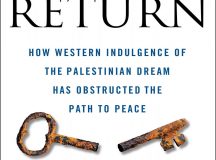Adi Schwartz and Einat Wilf are the authors of The War of Return: How Western Indulgence of the Palestinian Dream Has Obstructed the Path to Peace (2020), which Peter Beinart, in his widely read Guardian essay ‘The Jewish Case for Palestinian Refugee Return’, called ‘influential’. Here they respond to Beinart’s essay.
Peter Beinart is close. He is slowly inching towards understanding the core of the conflict. He finally realises that the conflict is clearly not about all those things that we were told for decades. It is not about the military occupation of lands controlled as a result of the 1967 war. It is not about the settlements built in those lands. It is not even about Israeli control of East Jerusalem. While obviously Palestinian Arabs want all of these to end, Beinart understands that ending those would not bring an end to the conflict. Perhaps having read our book The War of Return, as he describes (The Guardian, May 18), Beinart finally understands that Palestinians have always wanted something more. He understands that the Palestinian demand to settle inside the sovereign territory of the state of Israel in the name of ‘return’ — known as ‘The Right of Return’ — is far more important to Palestinians than those issues related to the ‘occupation’, ‘settlements’, and even Jerusalem.
So Beinart proposes that Israel accept that demand to settle millions of Palestinians inside Israel, arguing that it is both doable, desirable, and above all — a deep realisation of Jewish values. Doing so, he believes, would redress decades-old Palestinian grievances, which would in turn allow peace and prosperity to prevail.
But Beinart’s proposal misses entirely what the ‘Right of Return’ was designed to achieve. As we discuss in depth in our book, this idea of a ‘Right’ of all Palestinians to settle en masse in Israel, in breach of its sovereignty, which was never recognised as a right under international law, was developed by the Arabs after their defeat in the war of 1948, purposefully as a means of continuing that war by other means. Demanding ‘return’ was never meant to achieve peace, but to obtain the same goal that escaped the Arabs in the war of 1948 — the prevention of Jewish self-determination.
Settling the original refugees and their millions of descendants in the State of Israel was not, and is still not, a humanitarian gesture, as Beinart seems to believe, but a political action, aimed at restoring Arab and Muslim dominance to a land that the Palestinians view as exclusively theirs. In that, the ‘Right of Return’’ was never an innocent idea, divorced from the broader Arab political rejection of Jewish self-determination. It was never about simply returning Arabs to the entirety of the land — but about returning the entirety of the land to the Arabs.
This is the reason why, despite many Palestinian refugees wanting to return to their homes in the course of the war or immediately thereafter, the Palestinian leadership opposed it, arguing that doing so at that particular moment would mean effective recognition of Israel’s existence. It was clear that the issue of the return of the refugees was subsidiary to the greater question of denying Israel’s legitimacy. As long as the refugees’ return was considered to reflect favorably on Israel’s legitimacy, it was rejected. In the summer of 1948, the Jerusalem Mufti Haj Amin al-Husseini, the leader of the Palestinian Arabs, signed a decree in the name of the Arab Higher Committee, assailing the willingness of Arab states to return the refugees to Israel on the grounds that this would require negotiations with the newborn state and would thus grant it effective recognition and legitimacy.
In the same spirit, another Arab Higher Committee official, Emil Ghury, rejected any possibility of returning the refugees home, since this would ‘serve as the first step towards Arab recognition of the State of Israel and of partition.’ The solution, in his words, ‘was only possible through the renewed conquest of the territory that was captured by the Jews and the return of its inhabitants.’ The return was part and parcel of the reconquest of the territory. He explicitly warned against seeing the problem through too small a lens, as if it were a purely humanitarian question. He lamented that ‘they have turned a matter of jihad into a problem of refugees’. Looking to the future, Ghury was clear, resolving: ‘We are concerned to return and turn the question into a question of jihad. We are concerned to harvest hatred of the Jews in the heart of every Arab.’
This was the beginning of a linkage that exists to this day between the refugee problem and the broader aims of the Arab world in the conflict. Palestinian leaders demonstrated that they considered the plight of the refugees secondary to the main political question—the elimination of Israel, the reversal of the outcome of the war, and the prevention of territorial partition. Return, therefore, was not and is still not, merely a matter of geography, but also of time. It is not merely about moving ten or twenty miles to homes left behind, but primarily about returning to a time before the establishment of Israel and The Disaster, The Nakba. At the time, the disaster was meant to refer not just to the displacement Palestinian Arabs, but to humiliating experience of defeat to the Jews. In the Arab conception, then, ‘Return’ is not only about physically moving from one place to another but about reversing all prior events.
The Palestinian historian Walid Khalidi elaborated in the 1950s that return was not an end in itself. In words that sound like a direct response to Beinart’s misguided aspirations, he wrote: ‘It is sometimes suggested that the way to solve the Palestine problem is to approach it in a piecemeal fashion . . . Settle the refugees and the biggest obstacle to the solution will be removed. But the Palestine problem will remain as acute as ever with every Palestine refugee settled. The refugees may be the outward evidence of the crime which must be tidied out of sight but nothing will remove the scar of Palestine from Arab hearts . . . The solution to the Palestine problem cannot be found in the settlement of the refugees’. This admission is the heart of the matter: instead of being a legal or humanitarian issue, then and now, the refugee problem is first and foremost a political problem, reflecting the Arab desire to dominate the entire land and to deny Jews sovereignty in any part of it whatsoever.
Shortly after the war, as the consequences of it became more evident and Israel’s establishment more difficult to ignore, the Palestinian leadership radically changed its position. Palestinian leaders realised that demanding refugee return could actually upset the new status quo and undermine the existence of the state of Israel. The demand for return, wrote Palestinian historian Rashid Khalidi in analysing the Arab mood of the time, ‘was clearly premised on the liberation of Palestine, i.e., the dissolution of Israel.’
Some Arab politicians and media explicitly linked the demand for return to the elimination of the state of Israel. In October 1949 Egyptian foreign minister Muhammad Salah al-Din said, ‘It is well known and understood that the Arabs, in demanding the return of the refugees to Palestine, mean their return as masters of the Homeland and not as its slaves. With greater clarity, they mean the liquidation of the State of Israel’. The Palestinian journalist and historian Nasir al-Din Nashashibi also explained, ‘We do not want to return with the flag of Israel flying on a single square metre of our country, and if indeed we wish to return, this is an honoured and honourable return and not a degrading return, not a return that will make us citizens in the State of Israel’.
An article in the Lebanese weekly newspaper Al-Sayyad declared in February 1949, as the war ended: ‘We are unable to return [the refugees] honourably. Let us therefore try to make them a fifth column in the struggle yet before us’. One year later, an article in the same newspaper claimed that the Palestinians’ return would ‘create a large Arab majority that would serve as the most effective means of reviving the Arab character to Palestine while forming a powerful fifth column for the day of revenge and reckoning’.
‘Having lost the war,’ wrote historian Avi Shlaim, ‘Arab governments used whatever weapons they could find to continue the struggle against Israel, and the refugee problem was a particularly effective weapon for putting Israel on the defensive in the court of international public opinion’. As Benny Morris wrote, ‘the refugees had been, and remained, a political problem,’ and Arab states reasoned that their return to Israel ‘could help undermine the Jewish State, to whose continued existence they objected’.
This is how the Palestinian demand to return was born, and this is the reason for its perpetuation for more than 70 years. Its purpose is to serve the goal of undoing Israel. Therefore, whenever an opportunity arose to solve the humanitarian aspect of the problem, without fulfilling the political goal of Arab dominance in the land, it was rejected. For example, Palestinians rejected Israeli offers to resettle some of the refugees in Israel right after the war as Israeli citizens. They also rejected compensation offers by Israel for the loss of property in the war, if it meant having to sign a comprehensive peace agreement that would legitimise Israel’s existence. Even when a Palestinian notable tried to build new houses and livelihoods for the Palestinian refugees in an experimental village in the beginning of the 1950s, thus improving their conditions of life and restoring their human dignity, the Palestinian reaction was to burn down the village. The purpose was not, and still is not, to rectify a moral or humanitarian injustice, as Beinart believes, but to undo Jewish independence. That, in Palestinian and Arab eyes, is the gravest injustice of all — that Jews are sovereign and masters of their fate in an area that Arabs believe should be exclusively theirs.
In January 2001, Fatah’s official magazine reiterated this idea arguing that the mass return of refugees would ‘help Jews get rid of the racist Zionism that wants to impose their permanent isolation from the rest of the world’. The exercise of the right of return was clearly not about humanitarian issues, but was designed to serve the political purpose of changing Israel’s character, terminating its nature as the nation-state of the Jewish people, transforming it into one more Arab-dominated state. In that, the Palestinians were presenting themselves as the kind doctors offering euthanasia for a patient who still very much wishes to live.
This underlying worldview explains why the Nakba is commemorated to this day on May 15th, the day after the establishment of the State of Israel. If the Nakba had meant the memory of Arab Palestinian dispossession or suffering, it could have been marked on the day that Haifa or Jaffa, two of the most important Arab cities prior to the war, fell to Jewish hands. It could have also been observed on the day the village of Deir Yessin was lost — a significant milestone that led to greater Arab flight in the war. But the Nakba does not represent the humanitarian loss of lives, or the fact that some Palestinians became refugees, but the political loss of dominance in any part of the land to the Jews and the humiliating defeat to their forces. The Nakba therefore continues to this day in Palestinian eyes, not because of possible evictions in Sheikh Jarrah, but because the Nakba is synonymous with the very existence of Israel: it will go on as long as Israel exists, and only Israel’s disappearance would put an end to it. To Palestinians, marking the Nakba is not about memories of the past, but about imagining a future when that past is reversed, Israel is gone and the land in its entirety is Arab.
* * *
There is no escaping the simple fact that the conflict persists because the goals of both sides are irreconcilable. Jews want to have a sovereign state in at least part of the land and Palestinian Arabs want for the Jews to not have a sovereign state in any part of the land. As pithily articulated by British Foreign Minister Ernest Bevin on the eve of partition: ‘His Majesty’s Government have thus been faced with an irreconcilable conflict of principles … For the Jews the essential point of principle is the creation of a sovereign Jewish State. For the Arabs, the essential point of principle is to resist to the last the establishment of Jewish sovereignty in any part of Palestine’ (our emphasis). Bevin understood quite well that this was not a conflict between two national movements, each seeking first and foremost its own independence, but rather about one group (the Arabs) seeking first and foremost to foil the independence of another (the Jews). Only a clear choice between these irreconcilable goals could therefore solve the conflict once and for all.
Beinart’s answer to this question seems clear: the Jews are the ones who should forfeit their state. This is the long-term project Beinart has been engaging in and to do so he seeks to convince Jews that forfeiting their state and their sovereignty and their self-defense is in fact the true realisation of Jewish values. It is an echo of an ancient dark desire lurking always in Jewish life — to escape the historical weight of being Jewish by disappearing completely, by ceasing to be Jewish, and at the very least by no longer being so visibly and obviously Jewish — as Israel and Zionism so clearly are. At the very least it preserves Jewish morality as a powerless people with no choices, known also as the view that the last time the Jews were truly moral was as they waited to enter the showers at Auschwitz.
In this attempt to portray the dissolution of Jewish sovereignty as a Jewish value Beinart posits an equivalence between Jewish and Palestinian ‘return’. But the conceptions of ‘return” of each side are merely the reflections of their mutually exclusive goals — of Jewish self determination versus its denial.
Given that at the birth of Zionism, the vast majority of Jews, having been dispersed for millenia, lived outside the Land of Israel, self determination in the land could only be fully realised through Jewish immigration – ‘returning’ — to the land. Jewish return to the land in of itself was never a goal of Zionism — self determination was. Jews could return to the Land of Israel, study Torah, live there and be buried for much of their time in exile. That in itself was not a goal of Zionism. The issue was that the land was ruled by others and Jews could not rule themselves. Zionism introduced the possibility that Jews could rule themselves in the land, and to that end called upon them to return to the land and help build their third sovereignty.
Since the premier goal of Zionism was sovereignty in the land rather than return to each and every square metre where their Hebrew, Israelite and Judean ancestors ever stepped, Zionist leaders agreed to various partition plans at every historical juncture. It is not that Jews didn’t dream initially of being sovereign in the entire land. The map that Chaim Weizmann presented to the 1919 Paris peace conference included not only the current state of Israel, Judea, Samaria and Gaza, but also parts of today’s southern Lebanon and the eastern bank of the River Jordan, today in the Kingdom of Jordan. However, when this plan met with reality, and first and foremost the presence of a large Arab population that resisted Zionist ambitions, Zionism was pragmatic enough to adjust its romantic and spiritual desires to that reality. Since the goal was self-determination, borders were negotiable.
Comparing Weizmann’s map with David Ben Gurion’s proposal for the partition of the British Mandate in 1946, one can clearly see how pragmatic Zionism was. In this map, submitted by the Jewish Agency to the Anglo-American Committee of Inquiry, one can clearly see the concessions that Zionism made, proposing that an Arab state would be established in the most historic areas of the Holy Land. In some 25 years, Zionism moved from demanding a large piece of the land, to partitioning and settling for what they could reasonably get.
When the United Nations voted in favor of partition in November 1947, it left Jerusalem – Zion in Hebrew, the origin of the word Zionism – in international hands as a corpus separatum. It also left the area known as Judea, just south of Jerusalem – from which the word Jew is derived – in Arab hands. Still, when news broke out that the UN voted in favor of a Jewish state on about half of the territory of the Mandate, thousands of Jews took to the streets and celebrated the coming attainment of sovereignty in even a small part of the land. Even though the Jewish state was to have a substantial Arab population, it was clear that once the state could finally open its doors to Jews from all over the world, the Jewish state would have a solid Jewish majority with all existing inhabitants remaining in place. That, and not the expulsion of Palestinian Arabs, as Beinart falsely claims, was how the Jewish state was to be established.
Contrary to this Jewish goal of self determination, even in much reduced territory, the overarching Arab goal was to prevent Jewish sovereignty in any part of the land. This was the goal that animated multiple outbursts of violence against early Jewish Zionist presence in the land, under the Ottomans, and later under the British, as well as the blanket rejection of various partition plans, culminating in the war waged from 1947-1949 by Arabs from all across the region to prevent partition and the establishment of a Jewish state in any borders. It cannot not be emphasised enough that had Arabs accepted any of the partition plans, there would have been two states — one Jewish, one Arab — living side by side in peace and no-one would have been displaced.
If Jews had mimicked the Palestinian version of ‘return’, which insists on settling in all specific sites where their ancestors had lived, then Jews would have resisted partition again and again, insisting that only the full return to the Temple Mount, Shiloh and Beit El, Hebron and Jericho, and all biblical historical sites where Israel was shaped as a nation, is acceptable and anything less than that is cause for total war. But Zionist Jews were pragmatic enough and realistic enough to understand that to insist on return to the specific places of their ancestors disregarding changes that occurred on the ground, and ignoring the rights of their neighbors, would mean perpetual war.
In fact, Palestinian refugees and their descendants had multiple opportunities to mimic the Jewish Zionist version of return into a sovereign state of their own. Palestinians could have returned to a Palestinian state, that, like the Jewish state, would not encompass each and every place to which they have a historical and emotional connection. This was offered to them by Bill Clinton in 2000 and by Ehud Olmert in 2008. But Palestinians repeatedly rejected these offers, making it clear that return to an independent sovereign Palestinian state in part of the land was simply not what they wanted.
Beinart and many others want us to believe that there was once a time when Palestinians supported a two-state solution, but since Israel took steps to prevent it, the only remaining moral choice currently is to settle the Palestinian refugees and their descendants inside Israel. But the two-state solution was never alive, not because of Israeli actions, but due to the Palestinian insistence on settling inside Israel in the name of ‘return”. This was the reason for the repeated breakdown of multiple rounds of negotiations.
* * *
In this effort to paint the dissolution of Jewish sovereignty as a supreme Jewish value, Beinart hopes to shame Jews into becoming willing participants in stripping themselves of their sovereignty by overwhelming them with gruesome details of Israeli actions in the 1948 war. In doing so, he seems to suggest, as many Palestinians do, that supporting their ‘return’ would be the minimum expected of Jews to atone for their actions in the past. But the horrors of the war itself could not possibly be the reason that Palestinians demand ‘return’. If anything, it is the exact reverse. Arab grievance against Zionist Jews predated the war. The war itself was the outcome of the culmination of Arab violent rejection of Zionism that started as soon as the Jews had started building their national home in their ancestral land at the end of the 19th century. The war, the casualties, and the atrocities committed are not the real source of Palestinian grievances: rather, it is losing some of the land — any part of it — to Jewish sovereign control. Palestinian Arabs and Arab armies committed gruesome atrocities throughout the war, which was not necessary had they only accepted partition. Other conflicts in the world, which took place at the same time, were much bloodier and resulted in many, many more deaths and refugees. Still, no one even imagines Germans returning to the Czech Republic from where they were brutally expelled in 1946, with some hurled into cattle cars with their eyes gouged out as they were sent over the border. Also, no one suggests Pakistanis and Indians returning to their previous homes after the bloody population transfer that took place during the Indian subcontinent’s division, when packed train wagons carrying only dead corpses of fleeing refugees crossed the new border.
There is no averting one’s eyes from the simple realisation that the conflict between Jews and Arabs ends and is fully resolved under one of only two stark outcomes: either anti-Zionism renders the Jews no longer in possession of self-determination in the land, as Beinart seems to suggest, or Zionism is finally accepted by the Arab world, and Jewish self-determination is allowed to stand. Short of these two outcomes, the conflict continues, with violence ebbing and flowing and changing forms and means.
* * *
The land between the Jordan River and the Mediterranean Sea can be divided, and so can the water, air, and the natural resources. Security arrangements could be made. Settlements could and have been uprooted. But the thing that could not be reconciled is Zionism with anti-Zionism. Resolution of the conflict, in the sense of it being fully and completely over, means that either Zionism stands, or anti-Zionism stands. Both cannot. There is no ‘middle of the road’ between Zionism and anti-Zionism. The middle of the road is the conflict we’ve had for the past 150 years.
Peacemakers must choose which path to peace they favor to resolve the conflict. There are those who seek to end the conflict by ending Zionism, as Beinart does, and so they advocate a wide variety of means for stripping Jews of their sovereignty. Whether they call for ‘one state’ or ‘two states and “return”’ or ‘justice and rights for Palestinians’, these are all formulations that unfortunately still mean that nowhere and in no borders will the Jews govern themselves and exercise power. But we firmly believe that there is yet to appear a viable alternative to Jewish self-determination as a means of securing the safety, dignity and thriving of the Jewish people, and we refuse to be placated by empty promises that Jews would be just fine as a minority living among others, even when there is no more Israel. We do wonder where the people who wave aside concerns about the fate of Jews without sovereignty will be once they are proven wrong.
Our path to peace then is that of Arab acceptance of Zionism. Arab acceptance of Zionism is an achievable goal, and the Abraham Accords pointed to what such a future might look like. Yet, it is not likely to become the prevalent position across the Arab world before most Arabs and Palestinians have exhausted all means of ridding the region of the Jewish sovereignty – from wars to terrorism to international condemnation – and found them wanting. This will not happen as long as Palestinian idea of ‘return’ is indulged by the West.
The West once used to understand a basic truth: that for there to be peace, the war must end. When Palestinians finally come to terms with the fact that their long war against Jewish sovereignty is over and that they can build a future for themselves next to Israel, but not instead of it, there will be peace.






































1- This article is riddled with distortions and inaccuracies.
2- Walid Khalidi was against settling the Palestinian refugees OUTSIDE of Palestine, and not against their RETURN to their homes.
3- At least 5,000 Palestinians who ventured to return back to their villages after Israel’s creation in 1948, were killed by Israeli soldiers.
4- To Ben-Gurion, Partition meant statehood, and statehood was the weapon to conquer the rest.
5- Moshe Sharett added that Israel’s territory will be determined by possession, not Partition.
6- That’s why Israel was proclaimed a state on the 54% of Palestine allocated to it by the 1947 Partition Plan, PLUS 24%, or half of the land allocated by the same Plan to the Palestinians. De facto, Israel ceased control over 78% of historic Palestine.
7- It’s pathetic to quote an opinion in the Lebanese weekly al-Sayyad as if it were official policy.
8- The amount of evidence fished out from the Israeli archives by decent Israeli historians showing a consensus in Israel’s political leadership about dispossessing and ethnic cleansing Palestine of Its indigenous population is overwhelming to quote in this short message, but it is publicly available for those interested in the truth.
Thanks Drs. Wilf and Schwartz for assembling the history in a clear understandable form. I think Mr. Beinart and others who like him are obsessed with Israel are really obsessed with destroying Israel and the Jews who live there. Looking at conditions in the Arab lands around Israel – war, oppression, degradation of women, imprisonment, torture and murder of dissidents makes me want to tell Beinart and his cohorts to shut their mouths, open their eyes, and stop lying.
What I think is needed is an understanding of how Peter Beinart has become a tool of the PNM. From what I’ve heard him say, he didn’t think about the Israel situation until the late ’00s/early ’10s. My guess is that during that time, he came across one of the smooth talking figures of the PNM, such as Youssef Munayyer, who knew how to press the do-gooder buttons of how much he is suffering and downplay his objectives. Beinart would have come away from that experience thinking “OMG, these people are really suffering, and a cause that I’ve supported is responsible for their suffering. They mean me no harm, they told me so themselves. What can I do to undo the suffering I’ve caused them?”
Resulting from his conversations with these smooth talkers, Beinart claims that the PNM was not always about genocidal ambitions towards the Jews. After all, his Palestinian partners have not demonstrated any genocidal ambitions.
What Beinart categorically refuses to consider is that there is a potential motive for talking about a willingness to live as loyal citizens in Israel if Israel would let them return besides willingness to live as loyal citizens if their conditions are met. That alternate motive is not to describe their objectives, but to gain sympathy and support for the cause of allowing unlimited return, which will give them the means to achieve their ultimate objective of resubjugating the Jews by the combination of demographic overload and democracy. Other than arguing that anyone who doesn’t accept the Palestinians’ claims at face value, no questions asked, is racist, what does Beinart claim is why one should accept one motive over another?
Palestinians are the weak party certainly some resort to violence in the absence of viable resolution to their daily suffering and a way to vent out their frustration. but you cannot but admit Palestinian on many occasions showed more flexibility. Remember it wasn’t a Palestinian who assassinated Mr. Rabin. My advise for us all is to go back to the basics. Those Palestinians ten or more millions. Lost their homes, properties and most of all lost their identity left with no hope in sight. Stop inventing justification for Israel behavior. You are definitely smarter then that. Unless you believe this is a divine intervention and a religious duty I find it difficult to continue with this comment.
To Jane Fontaine–It is your comment is “riddled with distortions and inaccuracies”, rather than the article. I will just address a couple: Your point 6–you completely ignore the basic fact that resolution 181 was a proposal, not a mandate. It required mutual acceptance and voluntary implementation. As the authors eluded to, The Arab side reject res 181 out of hand. Res 181then immediately lost any legally binding or precedential value. The Arabs not only rejected the plan, they immediately launched a war of attempted annihilation against the Jews of Palestine. The Jews had every right to defend themselves and declare an independent state in all parts of Palestine they could control-which is exactly what they did, legally and morally. The Arab side can hardly complain that the Israel was not confined to the proposed res. 181 borders when the Arabs themselves rejected them.
As for you point 8, these accusations are based on mostly private comments taken out of context. I refer you to Prof. Benny Morris who, in his book “The Birth of the Palestinian Refugee Problem-revisited” he agrees there is a record to support your accusation (I think he takes some of these comments out of context, too) he nevertheless completely rejects the claim that brand new Israeli government engaged in any grand scheme to expel Arab residents from the territories of the new state and blames the war–which the Arab side started as the sole cause of the mass dispossession of Arab (and Jewish) civilians during the war
This is one of the best articles I’ve ever read.
I would just add that Peter Beinart’s proposal is wrong for the same reason that the Left’s ideas about how to deal with crime, criminals and terrorism have always been wrong.
Mayor Giuliani was able to bring about a dramatic decrease in violent crime in New York by implementing a policy of zero tolerance.
Beinart’s proposal is to indulge the psychopaths, including the former Gazan Minister of the Interior and Palestinian Authority Foreign Minister, both prominent members of Hamas, who have both called for the extermination of the Jews.
‘Jews are understandably frightened of an organisation like Hamas, but the argument that I would make is that if you want a society that is equal for all people, what you need to do is give people the right to express themselves non violently; that if you deny people their political rights, and they have no voice non-violently, and you use the violence of state oppression upon them, you’re actually creating a recipe for more violence; and that ultimately freedom and equality for all people… is more likely to create a society that is stable and peaceful for all people.’
The above quote from Beinart shows not only how detached his ideas are from reality, but also how distorted is his perception of the present situation, which he sees as simply Israelis being in control of everything.
According to Beinart, Gazans have fired tens of thousands of rockets at Israel not because they enjoy a considerable degree of self-determination, but because they are denied any self determination!